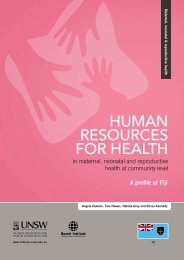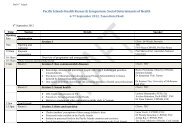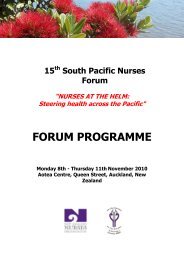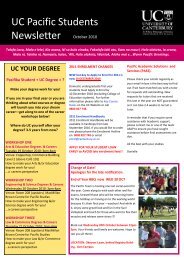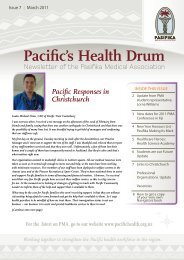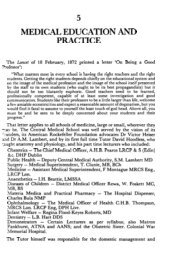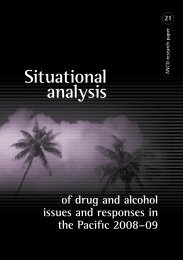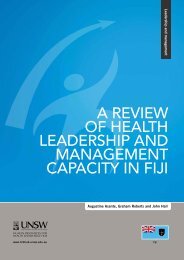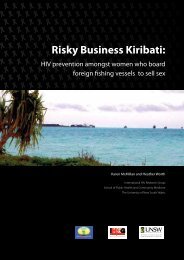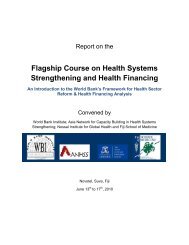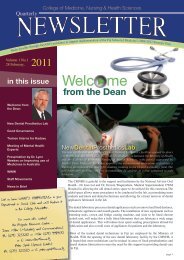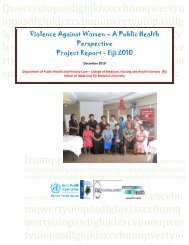rp21 situational analysis - Pacific Health Voices
rp21 situational analysis - Pacific Health Voices
rp21 situational analysis - Pacific Health Voices
Create successful ePaper yourself
Turn your PDF publications into a flip-book with our unique Google optimized e-Paper software.
new employment opportunities for the local<br />
people, but high daily rates of liquor consumption<br />
have been identified as a key<br />
contributor to the problems. The challenge<br />
laid down for the President’s Local Level<br />
Governments (LLGs) is for the electorate to<br />
work together in addressing the issue. This<br />
resulted in a call on the District Administrator<br />
and Bulolo MP, Sam Basil, to impose a<br />
liquor ban in the district. 597 Following consultations<br />
with various relevant authorities<br />
in the electorate, Basil supported the moves<br />
to impose the liquor ban and to improve<br />
police presence in the area. This is one example<br />
of a local-level response to problematic<br />
alcohol use.<br />
Another case where alcohol regulation and<br />
business have conflicted is that of the Cargillowned<br />
Higaturu Oil Palms, which involved a<br />
Christmas party alcohol order in the disasterstricken<br />
Oro province. 598 State-of-emergency<br />
laws prohibited the sale and consumption of<br />
alcohol in the province. The company, Oro<br />
province’s biggest private sector employer, has<br />
spent over PGK2 million 599 on humanitarian<br />
assistance, mainly targeting its flood-affected<br />
employees and villagers. 600 Staff claimed the<br />
incident was a misunderstanding, while village<br />
officials noted the behaviour breached<br />
conditions of employment visas in addition to<br />
being insensitive to the grief of their Papua<br />
New Guinean hosts. Such conflict between<br />
business and policy enforcement is an issue<br />
that continues to emerge across the <strong>Pacific</strong>.<br />
Despite calls in 2004 to address alcohol as a<br />
contributor to violence, it continues to be an<br />
issue in PNG. In 1995 the PNG Law Reform<br />
Commission found that 71 per cent of the<br />
women interviewed considered alcohol abuse<br />
as a major cause of marital problems, with<br />
26 per cent of those beaten by their spouse<br />
relating the incident to alcohol. While it is<br />
difficult to assess the extent to which this<br />
situation persists, a key informant from the<br />
PNG Highlands noted that substance abuse<br />
is often identified as a trigger for violence<br />
and injury where people presented to health<br />
services. 601 The link between alcohol and violence<br />
is supported by data collected as part<br />
of a rapid assessment undertaken by the<br />
123<br />
597 Ibid.<br />
598 Higaturu Oil Palms denies workers smuggled alcohol. <strong>Pacific</strong> Magazine, 24 December<br />
2007, available at: ; and at World News Zone:<br />
.<br />
599 Equivalent to US$680 000.<br />
600 Expatriates to be deported from PNG for taking liquor into flood emergency zone, Radio New<br />
Zealand International, 17 December 2007. Available at: .<br />
601 Personal communication, 2008; for links between substance abuse and violence, see Country<br />
Profile: Papua New Guinea in WHO (2004), Global Status Report on Alcohol 2004: Western<br />
<strong>Pacific</strong> Region, available at: ; Burnet Institute & Papua New Guinea Ministry of <strong>Health</strong> (2006, unpublished),<br />
(Draft) Rapid Assessment and Response: drugs and alcohol, HIV and development in PNG<br />
(findings have not been officially released).<br />
Papua New Guinea



